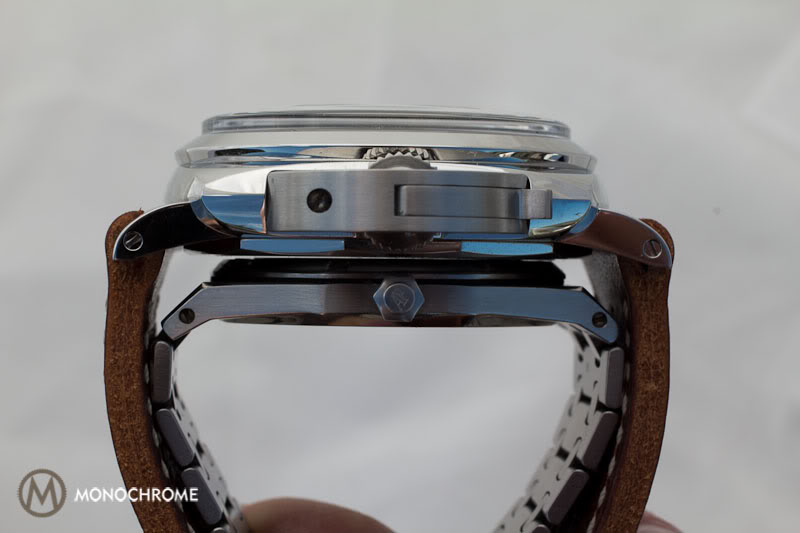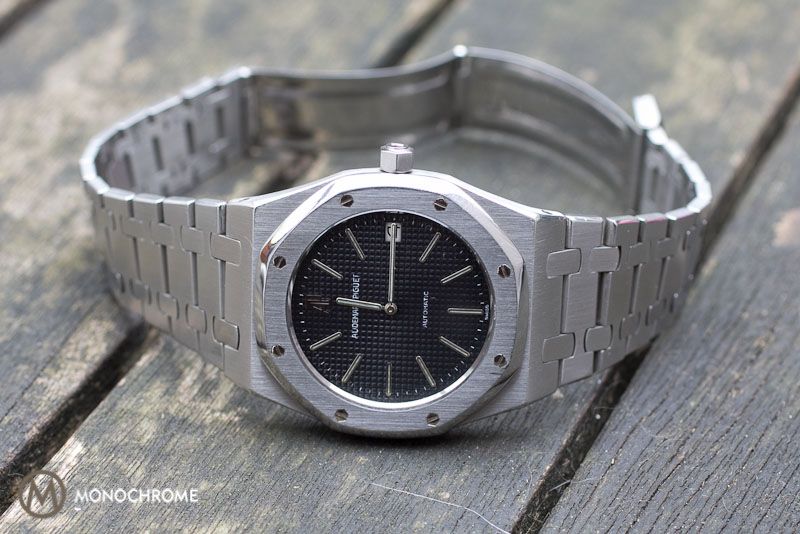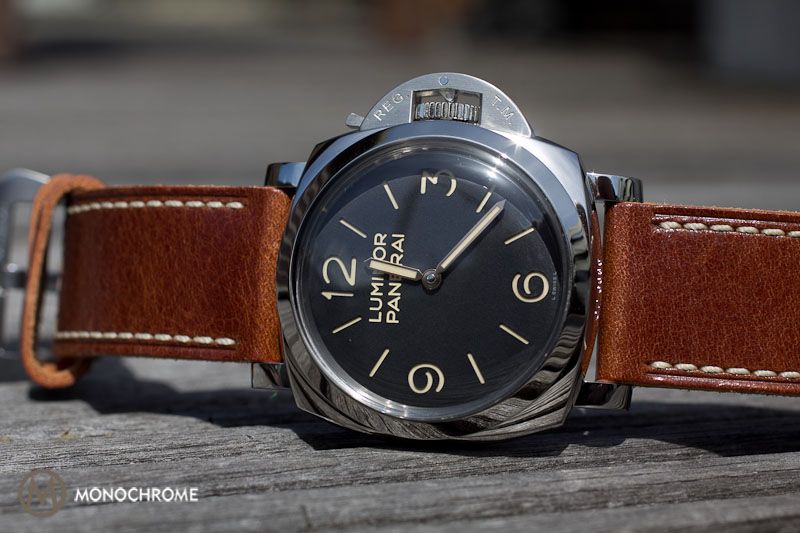Weekly Watch Photo – Panerai PAM372 vs Audemars Piguet Royal Oak ref 5402

Some photos need no comment and actually this Weekly Watch Photo is such a photo. It simply shows the strong contrast between two watches that are intended and can be labeled as sporty/casual. On top is the Panerai PAM 000372, one of Panerai’s most popular models of the past decade, and below is my own Audemars Piguet Royal Oak ref. 5402, the predecessor of the current Royal Oak ref. 15202 that could well be AP’s most popular timepiece – it certainly is the thinnest sports watch that was ever produced is series. The difference in height/thickness is striking! But what’s the main reason for this immense difference?
First the facts: the Panerai PAM 00372 measures 16 mm in height, and the Audemars Piguet Royal Oak (this is the vintage ref. 5402) measures exactly 7 mm. The Panerai is more than twice as thick. Now the question is, if there is a logical explanation for the difference in height. There are several factors that have an effect on the thickness of a watch. One factor that always plays a role is the thickness of the movement, and another factor can be water resistance. Let’s deconstruct both watches, and see what causes this rather impressive difference in thickness.

A manually wound movement is usually thinner then an automatic, because it lacks all the the automatic winding components. At least that goes for an automatic movement with a full rotor; an automatic with a micro-rotor is often quite slim. Based on this assumption one could conclude that the Panerai features an automatic movement and the Audemars Piguet features a hand-wound caliber.
That could have been a plausible conclusion, if it weren’t for the fact that this Panerai features a manually wound movement and inside the Audemars Piguet is an automatic movement. To be specific, the movement inside PAM00372 is the in-house caliber P.3000 that measures 37,4 mm in diameter and 5,3 mm in height. It offers thee days (72 hours) of power reserve, and indicates hours and minutes, nothing more.

The movement inside the AP is calibre 2121, which is the world’s thinnest automatic movement with a full rotor that is still in production. It measures 28,4 mm and 3,05 mm in height and offers 40 hours of power reserve when fully wound. It indicates hours and minutes, and even has a date indication.
So the big and thick Panerai has a manually wound movement, while the ultra-thin AP has an automatic movement. That isn’t the reason for this difference in height. Furthermore the Panerai P.3000 calibre is 2,25 mm thicker than AP’s calibre 2121, so that can also not be the reason for the huge difference in thickness.

Might it be the water resistance? When creating a watch that is water resistant to greater depths, goes hand in hand with a thicker crystal, a thicker case-back and actually the entire watch has to be thicker. The Panerai PAM 372 is water resistant up to a depth of 100 meters and the ultra-thin Royal Oak is water resistant to a depth of 50 meters. Well, that can’t be the reason for this massive difference. Especially not when you take into account that a Rolex Submariner – water resistant to 300 meters – is 13 mm thick.
Well, it seems we won’t find any logical reason for the difference in height, so let’s just say it’s all for design’s sake and this has nothing to do with technical constraints.




6 responses
Love the AP! It’s my grail watch. Spending that much on one watch isn’t possible for me at the moment however. Guess I have a motivation to find a good job 😉
As I see it:
The AP is subtle.
The Panerai is overt (as in “look at me”).
Or perhaps “classy” versus “rugged” looking. I’m sure they appeal to different buyers.
Interesting comparison. Thanks for the photos and the descriptions.
Omega’s caliber 711, the world’s thinnest automatic movement with a full rotor, measures 25.0 mm and 3.00 mm in height and offers 42 hours of power reserve when fully wound, not the AP 2121.
Thanks Paolo, you’re right. I must admit that I had never heard of Omega’s caliber 711.
Are VC’s 1120 and AP’s 2120 all manufactured by JLC for both companies, or else by themselves?
These calibres are produced by JLC as ébauche